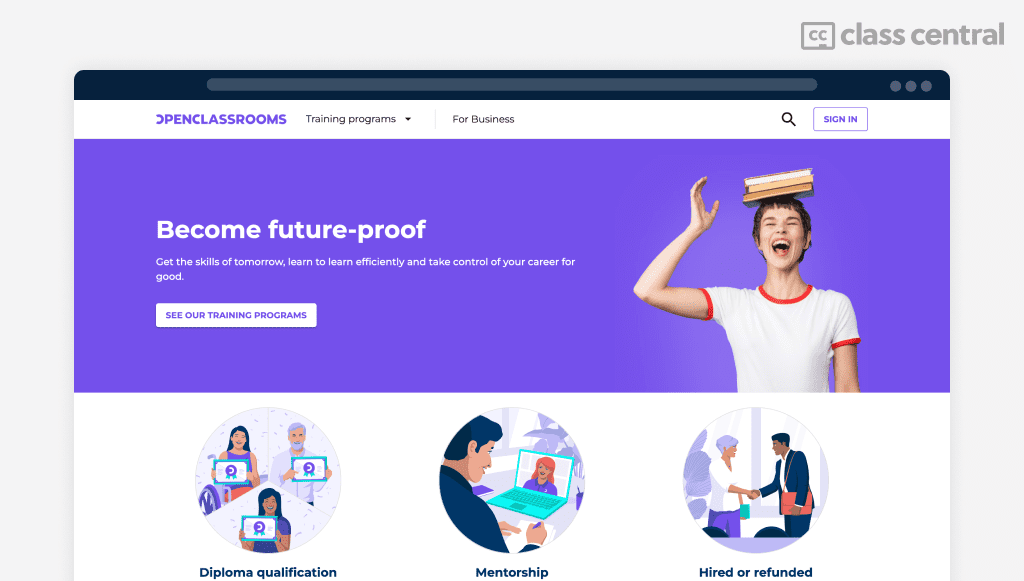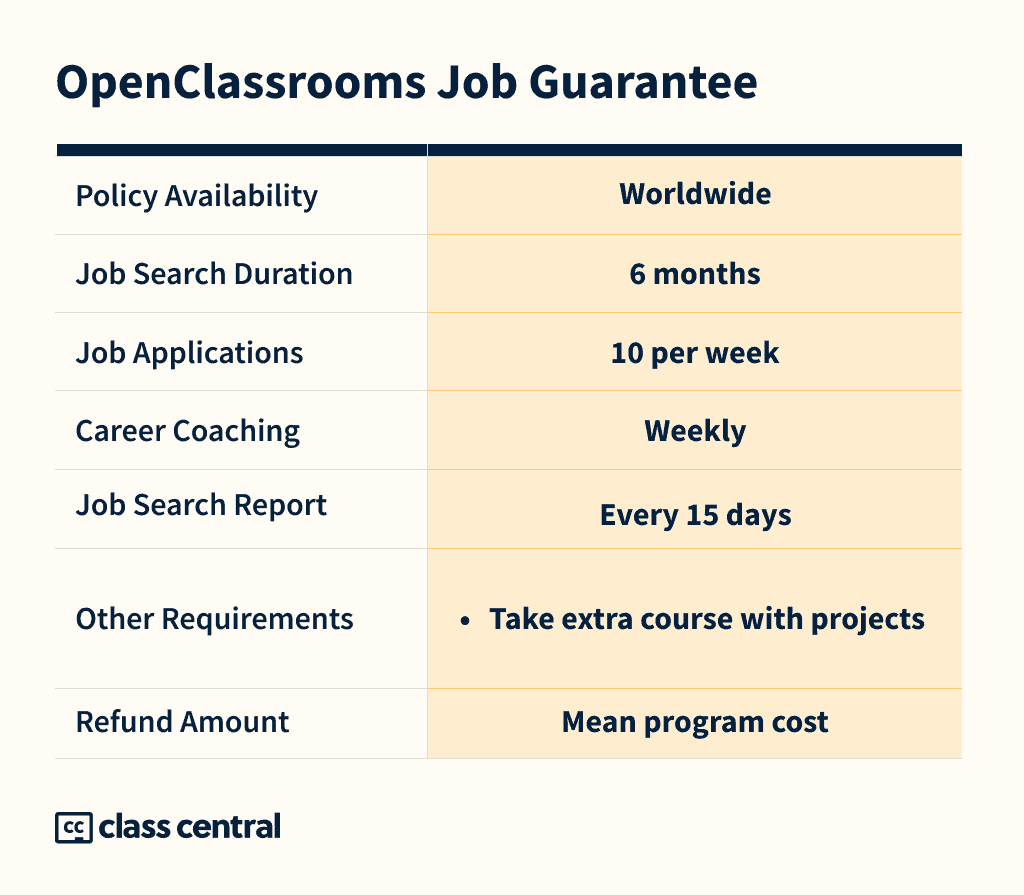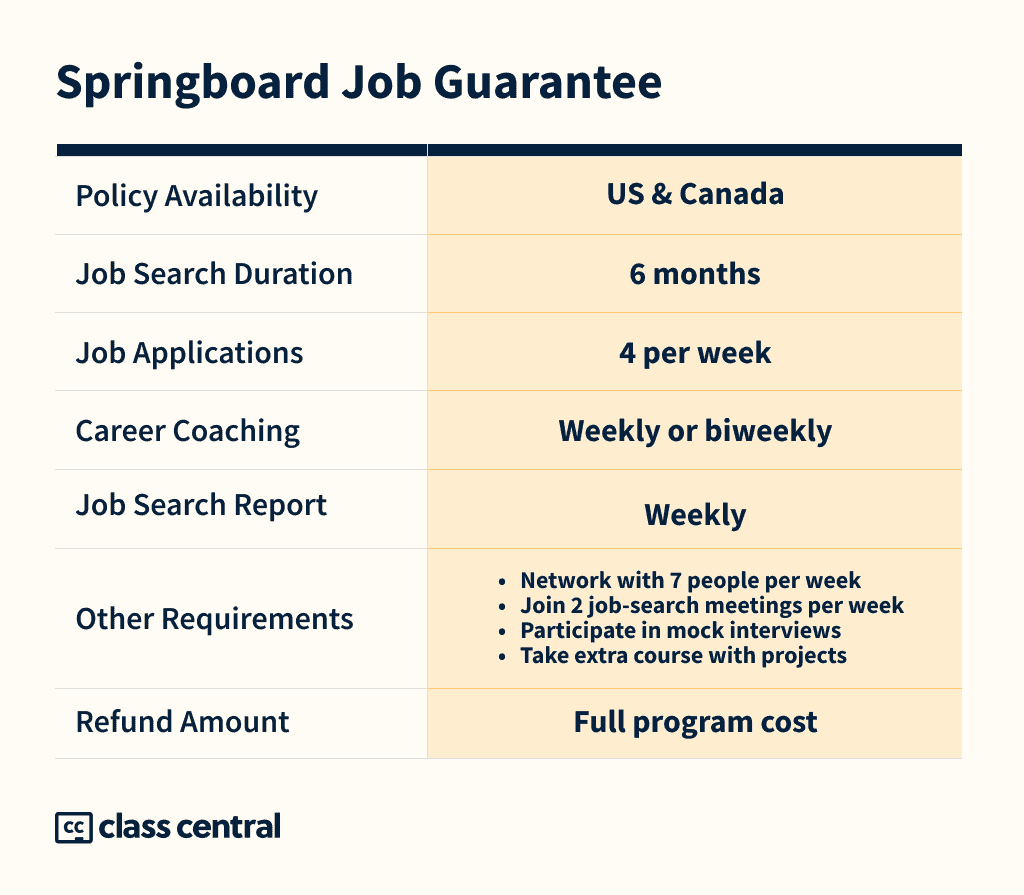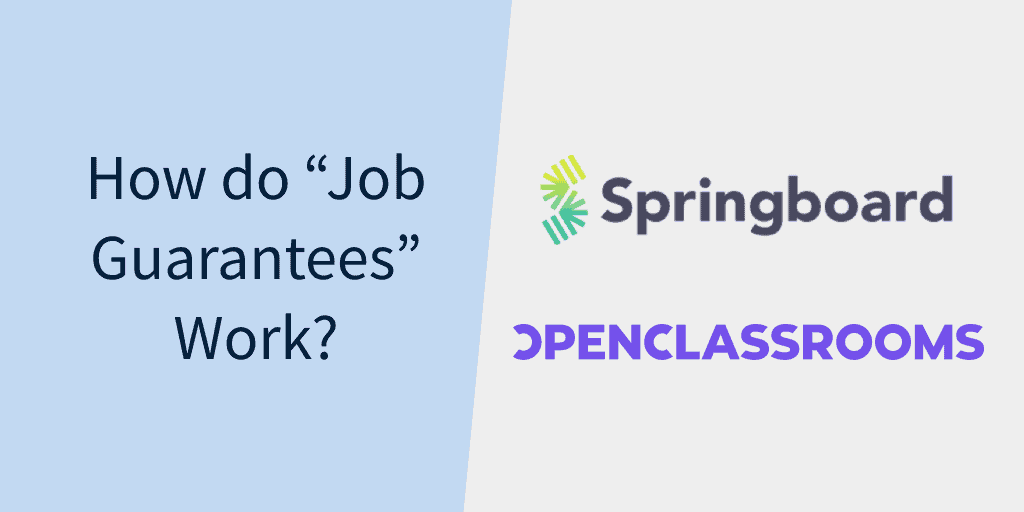Understanding Job Guarantees in Online Education
Some online learning platforms offer a “job guarantee”. Too good to be true? Let’s look at the details.
Certain online education platforms offer paid programs with so-called “job guarantee” policies. In short, if you complete their program, duly apply for jobs, but still can’t get one, they promise to refund you.
But this is an oversimplification. These policies come with a lot of fine print. And we know that when it comes to money, some platforms don’t mind engaging in questionable practices, as previously reported by Class Central: Bootcamps and ISAs: Economics, Challenges, and Opportunities.
So job guarantees can raise eyebrows. To understand them, there’s no shortcut. We have to follow the asterisks and read the terms and conditions.
In this article, let’s explain how job guarantees work through two case studies. We’re going to comb through the policies of two online education platforms, contrasting them and discerning some the aspects to be aware of.
But first, a word of caution. I’m approaching these policies as an online learner myself, not as a legal expert. I’m likely to miss some things and misunderstand others. So if you’re contemplating joining a program for its job guarantee, make sure to read the policy in full and look for learner reviews.
Job Guarantees in Nutshell
As you’ll see in this article, different job guarantee policies tend to have similar structures. To get a refund, you have to satisfy a number of conditions. These can typically be broken down into four phases:
- Preconditions: Conditions that must be met even before starting the program. For instance, the learner must live in a country where the job guarantee policy is available.
- Study Conditions: Conditions that must be met during the study period. For instance, the learner must successfully complete the program for the job guarantee policy to kick in.
- Job Search Conditions: Conditions that must be met during the job search period. For instance, the learner must apply to a certain number of jobs every week.
- Refund Conditions: Conditions that must be met when the search period ends to be entitled to a refund. For instance, the learner must ask for the refund within 30 days.
With that in mind, let’s discuss specific job guarantee policies.
OpenClassrooms Job Guarantee

The French online education platform OpenClassrooms offers free courses and professional certificates in topics such as web development, digital marketing, and IT, most entailing a year of full-time study.
These professional certificate programs come with a job guarantee policy, which OpenClassrooms calls “Hired or Refunded.” You can find the policy terms here. Here’s a table summarizing it:

Since this is the first policy we look at, let’s discuss some of its characteristics in more detail.
In terms of preconditions, OpenClassrooms’ job guarantee applies globally, whether you live in France, India, or the US. This can seem surprising, since job opportunities can vary wildly from country to country.
I imagine they’re comfortable offering a worldwide job guarantee because their policy is process-oriented and the process is intense enough to work in most markets. And when it doesn’t, the policy has a significant contingency: it requires learners to be mobile, even willing to relocate to a neighboring country.
In terms of study conditions, the requirement is simple: successfully complete the professional certificate program. The learner’s job search period starts right after their last assignment is validated.
In terms of job search conditions, the policy entails quite a bit. During 6 months, learners must:
- Apply to at least 10 jobs per week.
- Attend weekly coaching sessions with an OpenClassrooms adviser.
- Take an extra course and complete its projects, to facilitate the job search.
- Report to OpenClassrooms every 15 days, detailing all the applications sent, companies and people contacted, communications that took place, and potential job offers received.
In terms of refund conditions, as you’d expect, the main condition is to still be without a job by the end of the job search period. But it’s not just that. In order to be entitled to a refund, the policy also requires the learner to not have rejected or left unanswered a valid job offer.
So that’s the policy in a nutshell. Now what do we make of it? Here are some of the aspects that caught my eye when reading the policy, and that I think every prospective learner ought to be aware of:
Self-employment counts: If after completing the program, you start a business, then you won’t be entitled to a refund. This can seem sensible. But depending on where you live, creating a business can be a simple process. And no matter where you live, business success isn’t guaranteed. So if you plan to be self-employed, keep in mind it would likely mean becoming ineligible for a refund.
Refund cap: Most OpenClassrooms programs cost $480 per month, and they take 12 months of full-time work to complete. But that’s on average. Some students may take significantly longer. However, OpenClassrooms will only refund the mean program cost. So if you take 18 months ($8640) to complete the program, you’ll be refunded $5760 at most, not your full expense.
Relentless process: Serious job hunting is intense. But when you’re doing it on your own terms, there may be fluctuations: you may take a break from sending job applications during Christmas week, for instance. OpenClassrooms’ policy doesn’t seem to entail this sort of flexibility.
Pressure to accept: If you don’t accept a “valid” job offer, you won’t be entitled to a refund. The policy seems to define as valid any offer relevant to what you studied and remunerated in line with the local market. But it encompasses both part-time and full-time positions. So if you’re looking for full-time work, but get offered a part-time position and reject it, you may lose your refund.
Of course, I’m being finicky. Perhaps OpenClassrooms will follow the spirit of the policy rather than the letter. And they may not follow-up with the employers mentioned in your reports, meaning that even if you were to reject a “valid” offer, they wouldn’t know.
But you won’t know for sure until you send your refund request, 6 months after an intense job search that, by then, would have involved at least 240 job applications. Personally, I wouldn’t risk it. I’d treat the job search like a full-time job, trying to closely stick to the policy to preempt any potential refund refusal.
You can find OpenClassrooms’ job guarantee policy here. If you’re considering joining one of their programs for its job guarantee, remember to read the policy in full.
Springboard Job Guarantee

The US online education platform Springboard offers professional certificate programs in tech-related fields such as programming, cybersecurity, and data science, most of them with a job guarantee.
Interestingly, each Springboard program has its own policy. But as far as I can tell, these differ only in small ways. For instance, Springboard’s Data Analyst certificate requires two years of professional experience, while their Tech Sales certificate requires only one year for the policy to apply.
Here are all the job guarantee policies of Springboard’s programs:
- UX Design Career Track
- Tech Sales Career Track
- Data Science Career Track
- UI/UX Design Career Track
- Data Analytics Career Track
- Cyber Security Career Track
- Software Engineering Career Track
Since the terms of these policies are largely the same, in the remainder of this article, I’ll discuss them as if they were one single policy. Springboard’s job guarantee can be summarized as follows:

As you can see, Springboard’s job guarantee policy follows the usual pattern: a study phase followed by a job application phase, leading to a refund if you can’t get a job. That said, the policy also comes with its own quirks. Here are some of the aspects of the policy that caught my eye:
Not Global: The policy doesn’t apply worldwide. On the contrary, it’s very localized. First, it’s limited to two countries: the US and Canada. Second, it’s limited to specific cities within those two countries.
Working remotely is accepted, but even then, you’re asked to apply to positions tied to a specific list of metropolitan areas. So if you’d like to work locally but don’t live in one of the US top-20 or Canada’s top-5 largest cities, you likely won’t be eligible for the job guarantee policy.
Degree & Experience: To benefit from the policy, learners should have a bachelor’s degree, professional experience, and sometimes both. This is a significant requirement, seemingly designed to ensure learners possess the ability to succeed in an academic program and in the workforce, and are therefore prepared for Springboard’s career programs and job hunt.
But the requirement is also strict, severely reducing who can benefit from the job guarantee policy. If you have a degree, but want to switch careers via Springboard, you’re eligible. But if you don’t have prior studies and would like to use the program to jumpstart a career in tech, you can enroll in Springboard’s programs, but you won’t be eligible for their job guarantee. Unfortunately, those who could use the policy the most are precisely those who are left out.
Study Conditions: Springboard’s job guarantee policy includes conditions related to the study period. In short, the policy is contingent on the learner finishing the certificate program within 6 months — that is, you’re not allowed to fall behind, otherwise you might lose the job guarantee even before your job search begins.
Low Pays Count: To get refunded the cost of the program, you shouldn’t refuse a “valid” job offer. Springboard is rather explicit regarding what they consider valid: the offer should entail full-time or near-full-time salaried or freelance work. So if you were to apply for a full-time position, but the employer offered you a part-time one, you could refuse it and still be eligible for a refund. Good.
However, when it comes to pay, Springboard doesn’t mention a baseline for what it considers fair. So what happens if an employer lowballs you? They get back to you with a job offer that pays less than advertised in the job posting. If you reject the offer, could you lose your potential refund?
If you’re paying for the program using deferred tuition, the policy actually lists figures regarding what it considers sufficient pay (say, $40K a year). But if you’re paying for the program upfront or monthly (like most people, I imagine), there are no numbers mentioned. As a result, learners might feel pressured to accept the first offer they get, since they’d lose their refund anyway.
Remember, if you’re considering Springboard’s programs because of their job guarantee policies, make sure to read the terms in full. You can find all the policies here.







